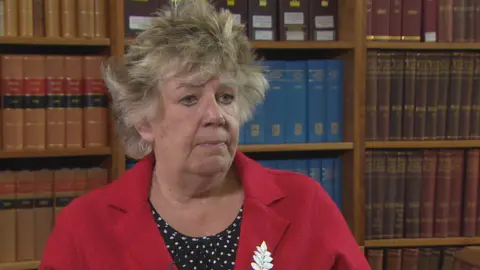Scottish judges aim to 'demystify' sentencing
 BBC
BBCScottish judges are laying out for the first time the way in which court sentences are reached in a bid to "demystify the process".
In the first public consultation of its kind, the Scottish Sentencing Council will reveal how judges make their decisions and ask if the public agrees.
The aim is to remove the perception that sentencing is inconsistent.
The guidelines list aggravating factors which could lengthen a sentence and must be taken into account.
These include premeditation, the use of a weapon and the presence of children.
They also list mitigating factors which might reduce the length of sentence, including the likely impact on the offender's children, or job, or that they have shown remorse.
Lord Justice Clerk Lady Dorrian, Scotland's second most senior judge, told BBC Scotland she hoped the new guidelines on the sentencing process would help clarify how decisions are reached.
"We very much hope that this will demystify the process," she said. "That has been our aim.
Lady Dorrian said the public consultation was looking at the "practical" issues the sheriff or judge could face.
It lays out the steps they go through, the factors they have to take into account and the necessary steps they take before reaching the sentencing.
Lady Dorrian said: "There was not any evidence of inconsistency across the country, but there was a clear perception of inconsistency and so addressing that was one of the main issues for the council.
"One of the issues we repeatedly have to bear in mind is that sentencing practice as a whole cannot be dictated by the result of one case.
"We have to look across the board at the practice in general and not look at isolated cases."

The guidelines stipulate that judges must assess the seriousness of the offence, select the range of sentence and consider aggravating and mitigating factors - and take into account a guilty plea.
The consultation states the Sentencing Council intends that the "guideline will promote a consistent approach to the process of sentencing in Scotland's courts and will enhance understanding of that process".
It also asks whether people agree "that the guidelines would lead to an increase in public understanding of how sentencing decisions are made" and "increase public confidence".
Young people
Gordon Jackson, Dean of the Faculty of Advocates, said he believed there was some inconsistency in sentencing.
He said: "Particularly in the sheriff court it can be a bit of a lottery, so anything that improves that is to be a good thing and that is in everyone's interest because I think judges find it really hard to sentence.
"It makes it easier for us to advise our clients of what is happening and maybe, most of all, we might be able to reassure the public that it is not just an arbitrary lottery and that it is really being done properly."
The Sentencing Council was created in 2015 to try to address a perceived lack of consistency or logic in sentencing.
Their next step will be to publish sentencing guidelines for young people.
Lady Dorrian told the BBC that young people require a different approach.
She said: "Young people, because of their lack of maturity and lack of process between cause and effect, may be less culpable.
"They may be more subject to influences and peer pressure. They also have greater capacity to change and not reoffend."
